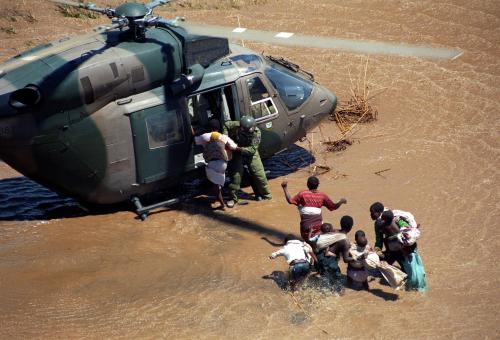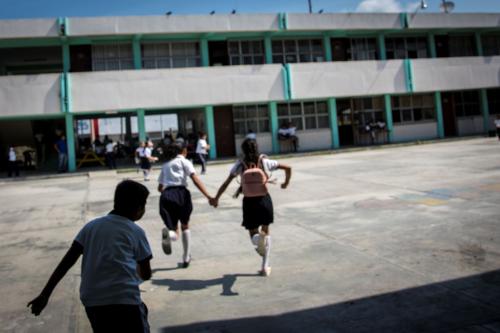After 49 years of absolute rule in Cuba, Fidel Castro has announced that he will no longer serve as president of the island nation. His resignation clears the way for his brother Raúl to assume control and shepherd Cuba’s controversial domestic and foreign policy agendas for the foreseeable future. President Bush views Castro’s resignation as an impetus for “democratic transition” and is calling on the international community to work with the Cuban people to work toward democracy and free and fair elections.
Transcript
“I think we were all really surprised that Castro resigned, because we thought that on February 24, when the National Assembly meets to select the Council of State and Ministers, that we would find out then whether Fidel was going continue or not. And, this is a very nice way to do it. Fidel himself is saying, “Thank you very much,” in a letter to Granma, the state paper. ‘No, this is it. I won’t be there.’ And, I think we can certainly count on the fact that Raúl Castro, his brother, will now be given, officially, the presidency of Cuba. And we’ll see the same hierarchy, they’ll shift around a little bit, there may be some new faces, but essentially it will be Cuba’s rulers who have ruled Cuba since the revolution.
“The name of the game in Cuba will always remain: staying in power. Raúl and the Cuban hierarchy have to stay in power. And, they have to do what is necessary to stay in power, which will be allowing some reforms because the Cuban people want better lives. They don’t like the $15.00 equivalent in pesos for a monthly salary. They’re tired of cramped housing. Healthcare has deteriorated. Raúl and the hierarchy, for legitimacy, need to address this and they’ll do it. But they’re not going to address the democracy side in any concerted way. And, given that they’re not going to do that, U. S. policy isn’t going to respond. We’re going to say, ‘When you get to democracy, come knock on our door. We’ll talk to you.’
“We’re allowing Raúl Castro, Fidel Castro and the Cuban government to dictate our foreign policy towards Cuba. Because it’s very much in our interest to empower the Cuban people. How else are we going to get change in Cuba if the Cuban people don’t call upon their government to make those changes? But as long as the Cuban people are completely dependent on the government for jobs, for food, for housing, for healthcare, they’re afraid to make that change. They’re also somewhat worried about what the United States might or might not do, and what Cuban-Americans might or might not do. What they would like to see is Cuban-Americans saying, ‘Don’t worry. We’re going to help you. We want to have more contact with you.’ That’s why allowing free travel of Cuban-Americans, and indeed of all Americans into Cuba, would only expand the horizons of the Cuban people, only reinforce their desire for freedom, and push the government toward a faster evolution toward some form of democracy.
“Raúl Castro is, first of all, a leader of the revolution, a commander of the rebel forces when they were in the Sierra Maestra. He has been the head of the armed services and has the complete loyalty of the armed services and the security services of Cuba which are the backbone of the revolution. He is a party secretary of the Communist Party. He is a collegial leader. He’ll work with the other people in the hierarchy – and he’s completely ruthless as well as pragmatic. He isn’t a people’s man. You know people like to say, ‘Raúl, he’s a nice family man.’ Well he might be a nice family man, but the man is ruthless. He’ll do whatever it takes to stay in power, just as his brother did whatever it took to stay in power.
“In five years, maybe Raúl will be turning over power – possibly even there could be elections. There’s no real powerful, powerful is the wrong word. There is no strong opposition, it’s a divided opposition in Cuba and unrecognized, that you could even imagine – maybe [Carlos] Lage, maybe Philippe Alarcon – somebody actually among the current hierarchy as Cuba’s next president. Because, after all, the election is through the National Assembly – it’s not through direct election from the population and that type of system.
“This should be the beginning of a process to freedom, to democracy, to economic betterment and stability for the Cuban people. At the same time we need to look at ways in which we can help them get there. And so far, we’ve removed ourselves from that equation and the longer we stay outside of that equation – by not having this contact, by allowing this communications embargo – the less we’ll have in the way of influence in Cuba.”
The Brookings Institution is committed to quality, independence, and impact.
We are supported by a diverse array of funders. In line with our values and policies, each Brookings publication represents the sole views of its author(s).



Commentary
Fidel Castro’s Resignation
February 19, 2008